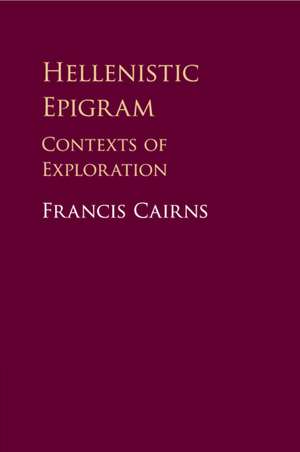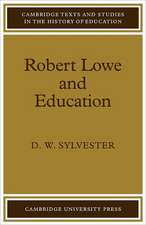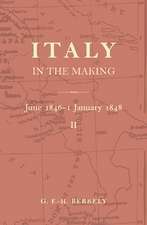Hellenistic Epigram: Contexts of Exploration
Autor Francis Cairnsen Limba Engleză Paperback – 15 ian 2020
| Toate formatele și edițiile | Preț | Express |
|---|---|---|
| Paperback (1) | 361.37 lei 6-8 săpt. | |
| Cambridge University Press – 15 ian 2020 | 361.37 lei 6-8 săpt. | |
| Hardback (1) | 871.85 lei 6-8 săpt. | |
| Cambridge University Press – 19 oct 2016 | 871.85 lei 6-8 săpt. |
Preț: 361.37 lei
Nou
Puncte Express: 542
Preț estimativ în valută:
69.16€ • 75.09$ • 58.09£
69.16€ • 75.09$ • 58.09£
Carte tipărită la comandă
Livrare economică 23 aprilie-07 mai
Preluare comenzi: 021 569.72.76
Specificații
ISBN-13: 9781316617878
ISBN-10: 1316617874
Pagini: 534
Dimensiuni: 153 x 230 x 30 mm
Greutate: 0.71 kg
Editura: Cambridge University Press
Colecția Cambridge University Press
Locul publicării:Cambridge, United Kingdom
ISBN-10: 1316617874
Pagini: 534
Dimensiuni: 153 x 230 x 30 mm
Greutate: 0.71 kg
Editura: Cambridge University Press
Colecția Cambridge University Press
Locul publicării:Cambridge, United Kingdom
Cuprins
Preface; Abbreviations; Part I. Introductory: Contexts and their Loss: 1. Audience context and circulation context; 2. Epigraphic context; 3. The state of the text; Part II. Afterlives: 4. Optimism; 5. Consolation; 6. Pessimism?; 7. Shipwrecks; Part III. Philosophical Matters: 8. Over-philosophical interpretations (Callimachus, Asclepiades, Posidippus); 9. Philosophical superficiality (Leonidas); 10. Meleager and philosophy; 11. Philodemus; Part IV. Temples and Shrines: 12. A shrine of the Great Mother; 13. Apollo's deer at Kourion; 14. Paphian Aphrodite; Part V. Literary Polemics: 15. Posidippus; 16. Asclepiades on Lyde; 17. Further Hellenistic literary programmes; 18. Antipater of Sidon; 19. Epigrams about Erinna; Part VI. Literary Polemics Continue: 20. Telchines and grammarians; 21. Polemic pro/anti epic?; Part VII. Poetry, Sex, the Countryside: 22. Poetry and sex; 23. Country matters; Part VIII. Medical Connections: 24. Medicine in non-epigrammatic Hellenistic poetry; 25. Medicine in epigram; Part IX. Epitaphs: Epigraphic or Epideictic?: 26. Death caused by wine; 27. Deaths while drunk; 28. Deaths of drunken old women; 29. Cenotaphic epitymbia; Part X. Local Interests: 30. Archaizing language: Anyte and Nicias; 31. Dialects; 32. Local customs: hair dedications; 33. Historical claims: the Thyreatis; Part XI. Speakers, Addressees, Antecedents: 34. Geese taken for swans; 35. Speakers and addressees in archaic inscribed epigrams; 36. Epitymbic speakers and addressees; 37. Unsafe assumptions of originality; 38. Over-interpretations of Hellenistic epigrams; Part XII. The Erotic: 39. Novelty in the erotic komos; 40. Legalism; 41. 'Enrichment' and emotion; 42. Cynical attitudes and mercenary motives; 43. Meleager and mosquitoes; Part XIII. Generic Innovation: 44. Implicit dialogue; 45. Explicit dialogue; 46. Initial generic deception; 47. Epigraphic genres in amatory epigrams; 48. Function as context; 49. Multiple addressees; Part XIV. Learning: 50. Philological; 51. Technical; 52. Metrical; 53. Mythography and local culture; Bibliography; Index locorum; Index anthologiae graecae; Index of personal names in epigrams; General index.
Notă biografică
Descriere
Investigates the literary, linguistic, historical, epigraphic, and other contexts of Hellenistic epigrams in themed chapters through analyses of individual epigrams.







